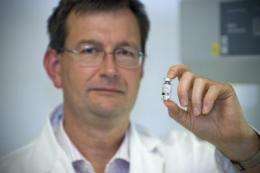Celiac disease vaccine shows promising results in Phase I trial

The world's first potential vaccine for coeliac disease has shown promising results for treating coeliac disease in a Phase I clinical trial and is expected to move to Phase II trials within the next year.
The Phase I trial undertaken in Melbourne, Australia, evaluated the safety, tolerability and bioactivity of the vaccine Nexvax2, which has been developed for coeliac disease. Coeliac disease is an autoimmune disease caused by an immune reaction to the gluten protein found in wheat, rye and barley.
The three peptides on which the vaccine is based were identified by Dr Bob Anderson from the Walter and Eliza Hall Institute's Immunology division. The vaccine is being further developed by US biotechnology company ImmusanT, of which Dr Anderson is Chief Scientific and Medical Officer. Dr Anderson presented the Phase I trial results on Sunday at the Digestive Disease Week symposium in Chicago, Illinois, US.
"Nexvax2® aims to desensitise patients to the three specific peptides in gluten that we have previously identified as 'toxic' to people with coeliac disease," Dr Anderson said. "Our Phase I study showed that Nexvax2 was safe to use and well tolerated, and importantly, that it had the desired biological response in patients with coeliac disease."
Up to one per cent of the global population is affected by coeliac disease, which is currently only treatable by eliminating gluten from the diet. In people with coeliac disease, immune cells react to gluten and trigger an immune response that damages the lining of the small intestine and inhibits its ability to absorb nutrients from food.
Dr Anderson said the vaccine would be suitable for treating the approximately 90 per cent of coeliac disease patients with the DQ2 genetic form of disease.
"In our Phase I trial, we saw a Nexvax2-specific T-cell response that confirms the desired bioactivity in HLA-DQ2 genotype patients," Dr Anderson said. "We expect the vaccine to enter Phase II trials within the next 10 months, and hope to demonstrate a dramatic reduction in the body's rejection of dietary gluten so patients can resume a normal diet and return to good health."
The Phase I study evaluated the effect of weekly injections of Nexvax2 over three weeks in coeliac patients on a strict gluten-free diet. At the highest doses, some patients had gastrointestinal symptoms similar to what they'd experience after eating gluten products. This suggests the vaccine uses the correct peptides for eventually being able to tolerate gluten.
Dr Anderson said the peptides used as part of the vaccine could also be used to improve diagnostic testing of coeliac disease.
"Diagnosing coeliac disease can be quite costly, requiring invasive tests and biopsies to confirm the disease," Dr Anderson said. "The results of a population study suggest that a combination of blood and genetic testing could effectively diagnose coeliac disease without these painful and invasive tests, with up to 50 per cent reduction in costs as well, which creates a win-win situation."
More information: www.immusant.com/














